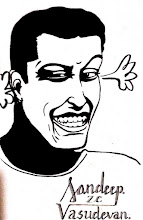Sunday, July 24, 2011
You Know I'm No Good
The first time I heard Amy Winehouse, it was her heart-wrenching lament Back To Black. What I noticed was the pain, which came floating gently through her rich, smooth caressing voice like a memory. The voice was mesmeric, quiet but deeply strong in its warmth, its need to tell you what’s hurting her, insistent but careful, like someone you just met at the bar, the jukebox has Duke Ellington on, she looks at you from under her smile and her mascara and you see a pervasive hurt softly lying over her. And she’s quietly, nostalgically telling you why.
It’s that voice that gets you, whether it’s the laconic obstinacy she displays in Rehab, the passive aggression of Me And Mr. Jones, the silent apology of You Know I’m No Good or the hopeless resignation of Back To Black. The whole album is the lament of a broken heart, and her genius shines through like a beacon through the darkened, fogged recesses of her raw, seared mind. Along with producer Mark Ronson she shook off her jazz influences that drove her first album Frank, and went deeper inside her, into soul; she brought back the grace of a forgotten time, when men were men and women were beautiful. It brings you to mind of a gentle evening, you sitting in a warm, dim room, a glass of bourbon in your hand and the soul of Motown running through your soul. One of the most evolved neo-soul album of recent times, it sees Winehouse adapt to R&B format with aplomb, combining emotion with a non-threatening, evocative, smooth-as-old-pain sound.
But they say that those that burn bright burn fast, and Winehouse shone like a supernova on speed. As she shone through her music, her heartbreak refused to find a catharsis and remained within her, spreading its insidious tendrils through her psyche. She was still only 23 when Back To Black came out. A fragile mind that sought release through rebellion and expression was forced to exorcise the pain that she built up carefully, powering her art as it destroyed her life. Drug abuse consumed her health and her performances, making her increasingly unreliable and weird. Other than a single which she contributed to Quincy Jones’ 2010 album, she had brought out no new music since Back To Black, and for 5 years her life spiraled out of control, taking her from zenith of adulation, acclaim and success back into the darkness of despair.
In the end she wasn’t strong enough to resist herself. Like Robert Johnson and all the rest of them, she died at 27. Like them, she shouldn’t have. But like them, she had to. As she said herself:
I cheated myself,
Like I knew I would,
I told you I was trouble,
You know that I'm no good.
Subscribe to:
Post Comments (Atom)


No comments:
Post a Comment